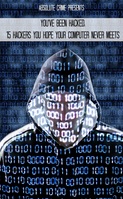You've Been Hacked: 15 Hackers You Hope Your Computer Never Meets

They were invisible. They unleashed some of the worse attacks on computers the world has ever known. And now they are exposed.
This book profiles 15 of the most notorious hackers in the world.
This book profiles 15 of the most notorious hackers in the world.
Buy Now!
You've Been Hacked PDF and ePub |
Excerpt
Hackers: A New Breed of Outlaw for a New World
Hackers have become one of the iconic symbols of our age. These new age outlaws have changed the way we view computers, technology, and our world. They have become heroes to many and symbols of a frightening new world to others.
Hackers redefined technology by demonstrating that giant computer networks could be used to empower the individual. Instead of making people nothing but cogs in the machine, computers enable those that can crack the code to manipulate the system for their own ends.
This power over technology makes hackers both romantic and frightening. Turning the tools of big government and big business against their creators makes hackers romantic outlaws. Individuals like Julian Assange and Samy Kamkar and groups like Anonymous try to portray themselves as modern-day Robin Hoods fighting tyranny and corruption.
Yet the same power over technology is frightening. Anybody anywhere can steal your most closely guarded secrets and your money through hacking. There is no privacy and no secrecy in cyberspace because of hackers. It’s easy to see how and why hackers have captured the public imagination. They’ve changed the world and will keep changing it through the power of technology.
Australia’s First Hacker: Nahshon Even-Chaim of the Realm
Nahshon Even-Chaim’s career as a hacker is marked by a number of firsts. He was the first person convicted for cybercrimes in Australia. He was also one of the first hackers specifically targeted and brought down by a national police agency.
Even-Chaim was a true pioneer – he was hacking before most people had ever heard of the internet. Indeed, some of his activities predated the creation of the World Wide Web in 1989. Even-Chaim was also a leading member of one of the earliest hacking groups, the Realm, based in his hometown of Melbourne.
Hacking Before the Web
When Even-Chaim started hacking in the 1980s, there was no World Wide Web; instead, there were loose networks of computers at research institutions, universities, government agencies, and corporations. These computers communicated with each over the phone lines, but there was nothing like today’s internet.
When Even-Chaim, who called himself Phoenix, started hacking, he had to physically dial the computers on the phone and connect via modem, although by 1990, the World Wide Web had been created and Even-Chaim was on it.
Phoenix’s targets were what worried Australian authorities – his hacking targeted defense installations and research institutions. The Australian Federal Police (the equivalent of the American FBI) began investigating Even-Chaim for violating a new law that covered cybercrimes.
Caught by a Wiretap
The Federal Police had become aware of Even-Chaim’s activities in 1988, possibly through an informant in the Realm. To catch him the police used an old but highly effective method – they got a warrant and tapped his telephone.
Investigators began monitoring Even-Chaim’s phone on Jan. 26, 1990 and kept up the monitoring for eight weeks. They recorded Even-Chaim bragging and joking. Like many hackers, Even-Chaim was undone by his bravado. He bragged that he had been able to get into NASA’s computers and hack local universities.
Even-Chaim and other Realm members apparently hacked into computers at universities in Melbourne. Those computers had a direct connection to NASA and other installations in the United States, which the Realm used to steal information.
Stealing Information Around the World
Even-Chaim was one of the first hackers to realize that he could steal information all over the world, not just in his own country. He was able to get into a NASA computer in Virginia (probably at the Langley Research Center), the University of California at Berkley, the Lawrence Livermore National Laboratory (a nuclear weapons facility in California), the University of Wisconsin at Madison, and into Purdue University’s systems in Indiana.
Yet he was able to do this without leaving his home in Melbourne. It’s easy to see why authorities were so worried. The crime was a new one and a frightening one. What’s interesting to note is the motivation for the data thefts is not clear.
The Realm members didn’t try to sell the information, nor did they make use of it. They seemed to have acted for their own amusement and little else.
Hacking and Celebrity
Even-Chaim was also one of the first celebrity hackers. He phoned The New York Times and complained about an article that attributed his break-ins to somebody else. Even-Chaim was upset because the article had attributed his work to him.
On April 2, 1990, the Phoenix got all the attribution he could want – the Australian Police raided his home in the Melbourne suburb of Caulfield North. Two other Realm members, Richard Jones (or Electron) and David John Woodcock, who was known as Nom, were also picked up.
Nahshon Even-Chaim found himself facing 48 counts of computer crime and facing 10 years in jail. He ultimately pleaded guilty to 15 of the charges, and his sentence was reduced to 500 hours of community service and a 12-month suspended jail sentence.
Off the Radar
Even-Chaim has something else in common with other famous hackers – he quickly dropped from sight after his arrest and has stayed out of sight ever since. Like the famed hackers who came after him, the man once called Phoenix has gone out of his way to stay out of the limelight.
Even-Chaim has avoided publicity since his hacking days. Reports indicate that he worked at IT in Melbourne and he may have been involved in the local music scene. Since his downfall, Even-Chaim has avoided all requests for interviews. He refused to cooperate with Kevin Anderson, who produced a documentary about the Realm’s activities called In the Realm of the Hackers.
The pioneering hacker is now more of a mystery than ever. His motives and his activities are still unknown and will probably remain a mystery.
Bibliography
Brisbane 2600. "Famous Hackers Nashon Even-Chaim." n.d. bris2600.com. Blog Entry. 28 May 2013.
Wikipedia. "Nashon Even-Chaim." n.d. en.wikipedia.org. Online Encyclopedia Entry. 28 May 2013.
Hackers have become one of the iconic symbols of our age. These new age outlaws have changed the way we view computers, technology, and our world. They have become heroes to many and symbols of a frightening new world to others.
Hackers redefined technology by demonstrating that giant computer networks could be used to empower the individual. Instead of making people nothing but cogs in the machine, computers enable those that can crack the code to manipulate the system for their own ends.
This power over technology makes hackers both romantic and frightening. Turning the tools of big government and big business against their creators makes hackers romantic outlaws. Individuals like Julian Assange and Samy Kamkar and groups like Anonymous try to portray themselves as modern-day Robin Hoods fighting tyranny and corruption.
Yet the same power over technology is frightening. Anybody anywhere can steal your most closely guarded secrets and your money through hacking. There is no privacy and no secrecy in cyberspace because of hackers. It’s easy to see how and why hackers have captured the public imagination. They’ve changed the world and will keep changing it through the power of technology.
Australia’s First Hacker: Nahshon Even-Chaim of the Realm
Nahshon Even-Chaim’s career as a hacker is marked by a number of firsts. He was the first person convicted for cybercrimes in Australia. He was also one of the first hackers specifically targeted and brought down by a national police agency.
Even-Chaim was a true pioneer – he was hacking before most people had ever heard of the internet. Indeed, some of his activities predated the creation of the World Wide Web in 1989. Even-Chaim was also a leading member of one of the earliest hacking groups, the Realm, based in his hometown of Melbourne.
Hacking Before the Web
When Even-Chaim started hacking in the 1980s, there was no World Wide Web; instead, there were loose networks of computers at research institutions, universities, government agencies, and corporations. These computers communicated with each over the phone lines, but there was nothing like today’s internet.
When Even-Chaim, who called himself Phoenix, started hacking, he had to physically dial the computers on the phone and connect via modem, although by 1990, the World Wide Web had been created and Even-Chaim was on it.
Phoenix’s targets were what worried Australian authorities – his hacking targeted defense installations and research institutions. The Australian Federal Police (the equivalent of the American FBI) began investigating Even-Chaim for violating a new law that covered cybercrimes.
Caught by a Wiretap
The Federal Police had become aware of Even-Chaim’s activities in 1988, possibly through an informant in the Realm. To catch him the police used an old but highly effective method – they got a warrant and tapped his telephone.
Investigators began monitoring Even-Chaim’s phone on Jan. 26, 1990 and kept up the monitoring for eight weeks. They recorded Even-Chaim bragging and joking. Like many hackers, Even-Chaim was undone by his bravado. He bragged that he had been able to get into NASA’s computers and hack local universities.
Even-Chaim and other Realm members apparently hacked into computers at universities in Melbourne. Those computers had a direct connection to NASA and other installations in the United States, which the Realm used to steal information.
Stealing Information Around the World
Even-Chaim was one of the first hackers to realize that he could steal information all over the world, not just in his own country. He was able to get into a NASA computer in Virginia (probably at the Langley Research Center), the University of California at Berkley, the Lawrence Livermore National Laboratory (a nuclear weapons facility in California), the University of Wisconsin at Madison, and into Purdue University’s systems in Indiana.
Yet he was able to do this without leaving his home in Melbourne. It’s easy to see why authorities were so worried. The crime was a new one and a frightening one. What’s interesting to note is the motivation for the data thefts is not clear.
The Realm members didn’t try to sell the information, nor did they make use of it. They seemed to have acted for their own amusement and little else.
Hacking and Celebrity
Even-Chaim was also one of the first celebrity hackers. He phoned The New York Times and complained about an article that attributed his break-ins to somebody else. Even-Chaim was upset because the article had attributed his work to him.
On April 2, 1990, the Phoenix got all the attribution he could want – the Australian Police raided his home in the Melbourne suburb of Caulfield North. Two other Realm members, Richard Jones (or Electron) and David John Woodcock, who was known as Nom, were also picked up.
Nahshon Even-Chaim found himself facing 48 counts of computer crime and facing 10 years in jail. He ultimately pleaded guilty to 15 of the charges, and his sentence was reduced to 500 hours of community service and a 12-month suspended jail sentence.
Off the Radar
Even-Chaim has something else in common with other famous hackers – he quickly dropped from sight after his arrest and has stayed out of sight ever since. Like the famed hackers who came after him, the man once called Phoenix has gone out of his way to stay out of the limelight.
Even-Chaim has avoided publicity since his hacking days. Reports indicate that he worked at IT in Melbourne and he may have been involved in the local music scene. Since his downfall, Even-Chaim has avoided all requests for interviews. He refused to cooperate with Kevin Anderson, who produced a documentary about the Realm’s activities called In the Realm of the Hackers.
The pioneering hacker is now more of a mystery than ever. His motives and his activities are still unknown and will probably remain a mystery.
Bibliography
Brisbane 2600. "Famous Hackers Nashon Even-Chaim." n.d. bris2600.com. Blog Entry. 28 May 2013.
Wikipedia. "Nashon Even-Chaim." n.d. en.wikipedia.org. Online Encyclopedia Entry. 28 May 2013.








